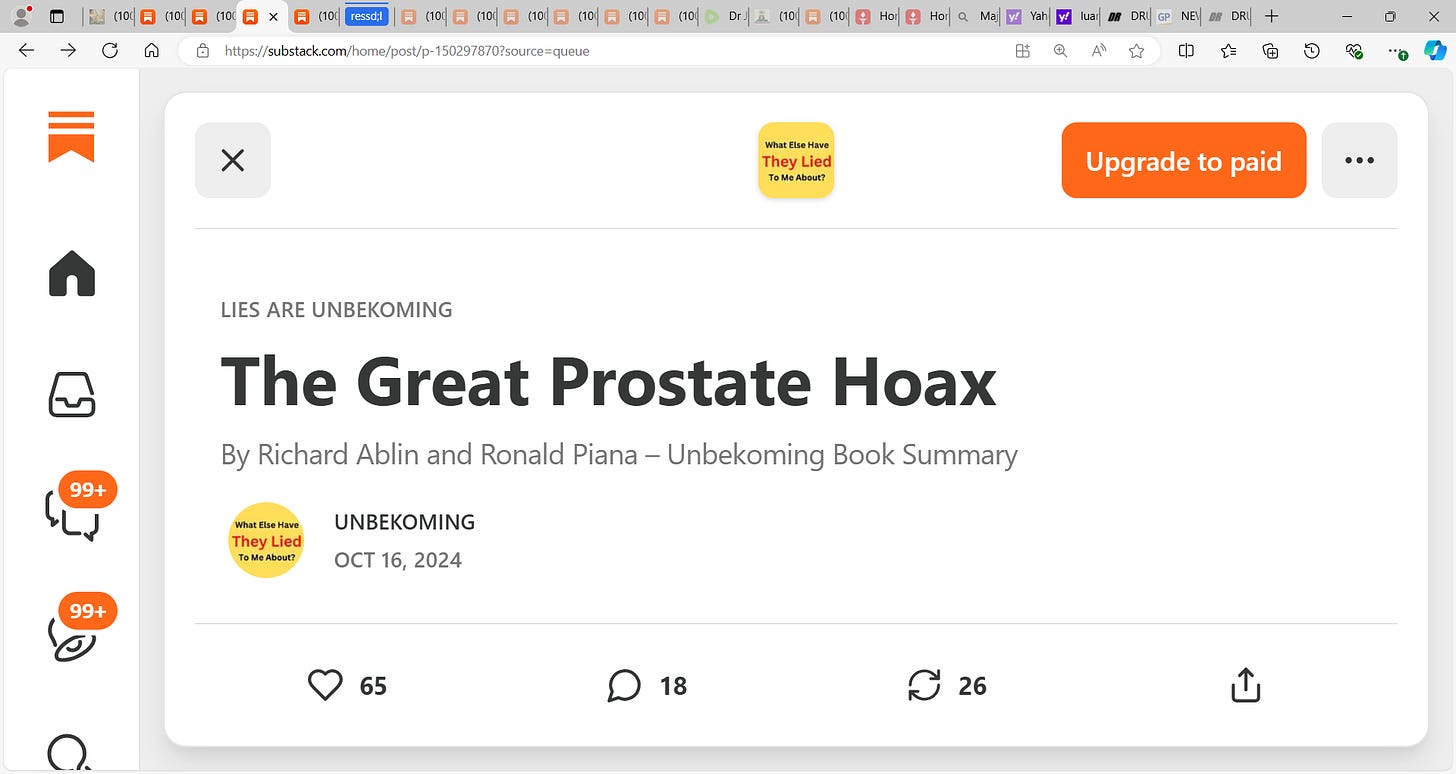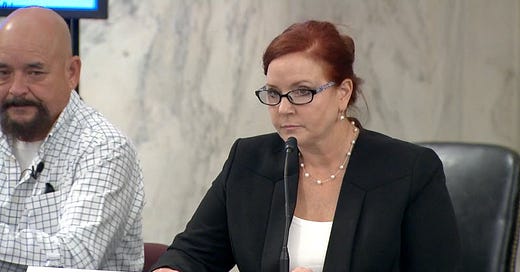
The GREAT Prostate cancer HOAX and PSA test con is like the GREAT Breast cancer hoax and mammogram test con; excellent PSA piece by Unbekoming; men are also meat for the grinder, especially when
their privates are involved. The screening hoax we witnessed with mammograms has a counterpart with prostates and the PSA test. two sub-Cartels, those of erectile dysfunction and incontinence.
Excellent stack by Unbekoming (support and start here) tackling a key issue that is often hidden for men:
The Great Prostate Hoax - Lies are Unbekoming (substack.com)
It’s not just women, Cartel Medicine feeds on, although it does prefer them.
Men are also meat for the grinder, especially when their privates are involved.
The screening hoax we witnessed with mammograms has a counterpart with prostates and the PSA test.
The predation here is especially synergistic as the maiming and destruction caused by prostate interventions feed two sub-Cartels, those of erectile dysfunction and incontinence. The adult diaper business is thriving because of this butchery.
The urologists, not wanting to be left behind by pediatricians, cardiologists, dermatologists and dentists have their own cozy racket.
With thanks to Richard Ablin and Ronald Piana for telling the truth.
Let’s start with an analogy.
Analogy
Imagine you're the owner of a large orchard filled with thousands of apple trees. You know that some of these trees might have a disease that could potentially kill them, but it's rare - only about 3% of your trees will actually die from this disease. The rest will live out their natural lives, disease or not.
Now, a salesman comes to you with a new "revolutionary" test that he claims can detect this disease early. He suggests testing all your trees regularly. It sounds great at first, but there's a catch:
The test often can't tell the difference between healthy trees, trees with harmless spots, and trees with the actual deadly disease. In fact, it's wrong about 80% of the time. When the test says there's a problem, you're forced to cut off large branches from the tree to check if the disease is really there.
For every 1,000 trees you test, you might save one tree from dying of the disease. But in the process, you'll unnecessarily damage hundreds of healthy trees. Many of these trees will never produce apples again, some will be permanently stunted, and a few might even die from the damage caused by your well-intentioned but overzealous pruning.
What's worse, the salesman and the pruning company are making a fortune from all this testing and pruning, which costs you millions every year. They're so invested in this process that they resist any suggestion to change it, even when other orchard experts start to question its value.
This is essentially what's happened with PSA screening for prostate cancer. The test, like our hypothetical orchard test, is often inaccurate. It has led to millions of men undergoing unnecessary biopsies and treatments, which frequently result in life-altering side effects. All of this for a disease that, in most cases, would never have caused them harm. Meanwhile, the medical industry has profited enormously from this process, creating a powerful incentive to maintain the status quo despite mounting evidence of its flaws.
The book's main message is a call to recognize this situation for what it is - a public health disaster driven more by profit than by sound medical science - and to advocate for a more measured, evidence-based approach to prostate cancer detection and treatment.
12-point summary
Here's a 12-point summary of the book, including key data and statistics for those that don’t want to read the longer Q&A below.
PSA (Prostate-Specific Antigen) is not cancer-specific. It's present in normal, benign, and cancerous prostate tissue. There is no specific PSA level that definitively indicates cancer.
Routine PSA screening leads to significant overdiagnosis and overtreatment. For every 1,000 men screened, only 1 man may avoid death from prostate cancer, while many others suffer unnecessary biopsies and treatments.
Prostate cancer is age-related. About 40% of men aged 40-49, 70% of men 60-69, and 80% of men over 70 have prostate cancer. Most of these cancers are slow-growing and unlikely to cause death.
The lifetime risk of dying from prostate cancer is only 3%, meaning 97% of men will die from other causes, even if they have prostate cancer.
Radical prostatectomy, a common treatment resulting from PSA screening, often leads to significant side effects. Up to 60-80% of men experience erectile dysfunction and 10-20% have long-term urinary incontinence.
PSA screening has not significantly reduced prostate cancer mortality. Studies show similar death rates between screened and unscreened populations.
The PSA test has a high false-positive rate of up to 80%, leading to many unnecessary biopsies and treatments.
Active surveillance is increasingly recognized as an appropriate option for many men with low-risk prostate cancer, potentially avoiding unnecessary treatments and their side effects.
The U.S. healthcare system spends an estimated $3 billion annually on PSA tests alone, with billions more on subsequent procedures and treatments.
New technologies like robotic surgery and proton beam therapy, while heavily marketed, have not shown superior outcomes to traditional treatments but are significantly more expensive.
Conflicts of interest are prevalent in prostate cancer care. Many researchers and physicians promoting PSA screening have financial ties to companies that profit from increased screening and treatment.
The FDA approved the PSA test for screening in 1994 despite significant reservations from its own advisory panel. This decision, along with aggressive marketing by medical companies, led to widespread adoption of PSA screening before its benefits and harms were fully understood.
___
You must not wait for another catastrophic crisis (at times manufactured but we are prevented from making our own basic personal decisions or accessing needed drugs and response tools) to catch you off-guard. We must take charge and be prepared today so that we can enjoy peace of mind tomorrow.
Enter the Wellness Company as a solution and a willing participant in the health care conversation. From telemedicine, prescriptions, memberships, and supplements, TWC is leading America with alternative choices to the traditional health care model.
If you wish to give a donation to help me, you can at:
Zelle:
sr7283@gmail.com
Or Ko-Fi
Ko-fi.com/drpauleliasalexander
Or to my address at:
150 South 8th Street
Unit 170
Lewiston, New York
14092
Alternatively, please consider going from an UNPAID subscriber or follower to a PAID at $5 per month or $30 per year. This can provide me help. If this is not possible at this time, this is ok, please remain a subscriber for FREE and there is no difference between FREE and PAID. No restrictions.
Please consider support of a good company Drs. McCullough, Risch, Thorp, myself support (they are our sponsors), The Wellness Company; see the emergency preparation kit (key component being antibiotics you were denied by doctors, pharmacists, governments during the fraud COVID), first aid kit, travel emergency kit, contagion control kit etc. Please consider the SPIKE SUPPORT (spike protein DETOX dissolving spike from mRNA vaccine, this is critical to remove spike form the mRNA vaccine/and DNA viral vector) formula with NATTOKINASE as well as the triple formula (SPIKE SUPPORT, BROMELAIN, CIRCUMIN)












Thanks Dr. Alexander. It is unfortunate that we just can’t trust anything pushed by the medical mafia.
I know someone that had a very low grade prostate cancer in his early 50’s. Gleason 4. PSA of about 8. He was talked in to prostatectomy and told there was no risk of ED or urinary incontinence. Guess what? He got both! He is in depends full time. Completely impotent. He had the surgery at a tertiary care center, supposedly an excellent place. To tell someone there is no risk of these outcomes is just a huge lie. I tried to tell him but he believed the surgeon.